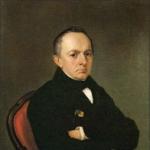Wikipedia article
Ё, ё - the 7th letter of the Russian and Belarusian and the 9th letter of the Rusyn alphabets. It is also used in some non-Slavic alphabets based on the civil Cyrillic alphabet (for example, Kyrgyz, Mongolian, Chuvash and Udmurt).
In the Old and Church Slavonic alphabet, there is no similar letter “ё” due to the lack of appropriate combinations of sounds; Russian "yokane" is a common mistake when reading Church Slavonic text.
In 1783, instead of the existing variants, the letter "e" was proposed, borrowed from French, where it has a different meaning. In print, however, it was first used only twelve years later (in 1795). The influence of the Swedish alphabet has been suggested.
The spread of the letter “yo” in the 18th-19th centuries was also hampered by the then attitude to the “yoking” pronunciation as a bourgeois, the speech of “vile mob”, while the “church” “yoking” reprimand was considered more cultured, noble and intelligent (among fighters with “ jokani" were, for example, A. P. Sumarokov and V. K. Trediakovsky
What do you know about the letter e? (shkolazhizni.ru)
The letter Yo is the youngest in the Russian alphabet. It was invented in 1783 by Ekaterina Dashkova, an associate of Catherine II, a princess and head of the Imperial Russian Academy.
The letter ё must die (nesusvet.narod.ru)
... in my opinion, the letter Yo is completely alien to the Russian language and must die
The letter was stolen from the French.
So if the letter Yo is Gallicism, then when, by whom and why was it introduced into Russian?
The letter Yo is the result of the arbitrariness of one person, Nikolai Mikhailovich Karamzin. Publishing his articles in journals, Karamzin, for the sake of external effect (or, as they would say now, "for show off") in 1797 used the European umlaut, the Latin "e" with two dots, in the Russian-language text. There were many disputes, but there were even more imitators, and the letter Yo quietly made its way into the Russian language, but did not get into the alphabet.
Sergei Gogin. Sacred letter of the alphabet (Russian magazine - russ.ru)
Despite the sacred seventh place that the letter “ё” occupies in the Russian alphabet, it is subjected to the greatest discrimination in the modern press. With the exception of literature for children, "yo" has practically disappeared from texts in Russian.
Encyclopedias indicate that the letter "e" was introduced by the historian and writer Nikolai Karamzin, a native of Simbirsk (this is the historical name of Ulyanovsk). Karamzin published the poetic almanac "Aonides", where in 1797 in Ivan Dmitriev's poem "Experienced Solomon's Wisdom, or Thoughts Selected from Ecclesiastes" for the first time in the word "tears" on page 186 the letter "ё" is found in its current style. At the same time, the editor in a footnote on this page states: "The letter with two dots replaces "io"".
The mortal letter of the alphabet (01/06/2012, rosbalt.ru)
In 1917, the commission for the reform of Russian spelling proposed to abolish "fita" (ѳ), "yat" (ѣ), "izhitsu" (ѵ), "i" (i), in addition, to limit the use of a hard sign and "recognize as desirable the use the letters "yo". In 1918, all these items were included in the "Decree on the introduction of a new spelling" - all but the last ... The letter "ё" plunged into lethargy. She was forgotten.
The rejection of the letter "ё" can be explained by the desire to reduce the cost of typographic sets and the fact that letters with diacritics make cursive writing and continuity difficult.
By uprooting the letter "ё" from the texts, we have complicated and at the same time impoverished our language.
Firstly, we distorted the sound of many words (the letter "ё" indicated the correct placement of stresses).
Secondly, we made it difficult to perceive the Russian language. The texts have become rough. To sort out the semantic confusion, the reader must re-read the sentence, the entire paragraph, sometimes even look for additional information. Often confusion arises from the combination of the words "all" and "everything".
And the names of Russian celebrities today do not sound the same as before. The Soviet chess player has always been precisely Alekhin, and Fet and Roerich were, after all, Fet and Roerich.
The rules of Russian spelling ("Complete academic reference book edited by Lopatin", 2006) states that the letter "ё" is mandatory only "in books addressed to young children", and in "educational texts for elementary school students and foreigners, learners of the Russian language. Otherwise, the letter "ё" can be used "at the request of the author or editor."
The letter "Ё" marked its serious age (11/30/2011, news.yandex.ru)
In Russia, the Day of the letter "Yo" was celebrated. The history of the seventh letter of the Russian alphabet began on November 29, 1783. On that day, one of the first meetings of the Academy of Russian Literature took place with the participation of Princess Ekaterina Dashkova, writer Denis Fonvizin and poet Gavriil Derzhavin.
Prokhorov will patent 10 trademarks for the letter "Yo" (Yandex News, 4.4.2012)
Mikhail Prokhorov's "Yo-auto" company filed 12 applications for registration of trademarks containing the letter "Yo" with Rospatent at once
The Russian alphabet consists of 33 letters, only one of them is often replaced with a similar one. As you guessed, we are talking about the letters "e" and "e". And everything would be fine if such a replacement in a number of cases would not be fraught with negative legal consequences. Let's take a closer look at them and talk about what to do in such situations.
1. The essence of the problem
Imagine, one fine day you come to the registry office, to a notary or somewhere else and it turns out that you simply do not exist. Officially. Legally. You are dressed, moving, talking, but you cannot perform a legally significant action. Because in your last name, instead of “yo”, there is “e”, and it turns out that we are talking about a completely different person.
For example, the name Gracheva is indicated on the birth certificate, and when you reach the age of 14, you were given a passport for Gracheva. All subsequent documents were issued according to the passport, including the marriage certificate. You decide to take your husband's last name, which requires, among other things, a birth certificate. This is where everything pops up. After all, only citizen Gracheva legally exists - a born person was recorded under such a surname.
Similar examples can be many and much simpler. Let's say you, citizen Pugachev, come to draw up an inheritance, only the will was drawn up in the name of Mr. Pugachev - the notary will refuse you. Complications can also arise during the privatization of housing, divorce and other transactions.
According to statistics, about 3% of Russian citizens have the letter "ё" in their surnames, names and patronymics. Accordingly, more than four million people may face problems similar to those described above. Unfortunately, we cannot exclude their occurrence. Documents are drawn up by people. Many of them, with absolutely no ulterior motive, can write “e” instead of “e”, since this is a common practice. The question is what to do if you find yourself in a similar situation.
Faced with this question, I wanted to know where all this confusion came from. I will briefly summarize my studies below, and those who want to immediately move on to practical recommendations, read.
2. The history of the letter "yo"
So, the birthday of the letter “ё” is November 29 (November 18, old style) 1783. The Letter owes its appearance to Princess Ekaterina Romanovna Dashkova, who, at the end of the next meeting of the Russian Academy, raised the question of the legality of expressing one sound with two letters, which had previously been the case with regard to the sound “e”.
The beech "e" first appeared in print in 1795, but by the end of the 19th century it began to be replaced by the letter "e", which had an economic justification. The fact is that the use of a “letter with dots” caused additional material costs with a letter or linotype set.
At the beginning of the Soviet period, the use of the letter "ё" was still optional. This is clear from the decree of the People's Commissar of Education A.V. Lunacharsky, published on December 23, 1917, which introduced a reformed spelling.
Officially, the letter “ё” entered the Russian alphabet in 1942 in accordance with the order of V.P. Potemkin, which prescribed its mandatory use in school practice.
In the Rules of Russian Spelling and Punctuation, approved by the USSR Academy of Sciences, the USSR Ministry of Higher Education, the RSFSR Ministry of Education in 1956, a separate section was devoted to the commented letter.
IV. letter yo
§ 10. The letter ё is written in the following cases:
1. When it is necessary to prevent incorrect reading and understanding of a word, for example: we learn in contrast to we learn; everything is different from everything; bucket as opposed to a bucket; perfect (participle) as opposed to perfect (adjective).
2. When it is necessary to indicate the pronunciation of a little-known word, for example: the Olekma river.
3. In special texts: primers, school textbooks of the Russian language, orthoepy textbooks, etc., as well as in dictionaries to indicate the place of stress and correct pronunciation.
Note. In foreign words, at the beginning of words and after vowels, yo is written instead of the letter ё, for example: iodine, iot, district, major
Although nothing is directly said about given names and surnames in this section, it seems that they should be attributed to paragraph 2 of § 10, namely, when it is necessary to indicate the pronunciation of a little-known word. How, after all, is the name of a geographical object essentially different from the name of a person?
The first point is also suitable - the need to prevent misreading of the word. In particular, it is on this basis that it is indicated in the letter on the decisions of the Interdepartmental Commission on the Russian Language dated May 3, 2007 No.
On May 20, 2005, the Federal Law of June 1, 2005 No. 53-FZ “On the State Language of the Russian Federation” was adopted. Article 3 of this law establishes that the use of the Russian language is mandatory, among other things, in:
“1) in the activities of federal state authorities, state authorities of the constituent entities of the Russian Federation, other state bodies, local governments, organizations of all forms of ownership, including in record keeping activities;
8) when drawing up documents proving the identity of a citizen of the Russian Federation, with the exception of cases provided for by the legislation of the Russian Federation, preparing forms of certificates of state registration of civil status acts, drawing up documents on education and (or) qualifications established in accordance with the Federal Law of December 29 2012 N 273-FZ "On Education in the Russian Federation" of the sample, as well as other documents, the execution of which in accordance with the legislation of the Russian Federation is carried out in the state language of the Russian Federation, when registering the addresses of senders and recipients of telegrams and postal items sent within the Russian Federation Federation, postal money transfers;»
As we said in the introduction, the Russian alphabet officially consists of 33 letters, one of which is the letter "ё". Thus, ignoring it in writing in cases established by law is a violation of federal law.
Nevertheless, in the Letter of the Ministry of Education and Science dated October 1, 2012 No. IR-829/08 “On the spelling of the letters “e” and “ё” in official documents”, it was noted that, according to judicial practice, “writing the letter “e” instead of “ё” and on the contrary, in the surname, name and patronymic does not distort the data of the owner of the documents, provided that the data on the basis of which it is possible to identify the person in such documents correspond.
In addition, judicial precedent when considering cases on making corrections or changes in civil status records is resolved in favor of the applicant (plaintiff).
The Supreme Court of the Russian Federation also made its contribution to resolving the issue in 2009, indicating that the use of the letter “e” is fundamental in cases where it is semantic. For example, it is obvious that the sky and the sky are words that are different in meaning. Adding dots to the word "perfect" turns it from an adjective into a participle "perfect", and so on.
Now we have come close to the question of what to do if you encounter problems associated with the incorrect spelling of the letters "e" and "ё" in proper names.
3. What to do?
I will not be original in this case and, as in my other articles, I will say: first try to resolve the issue peacefully. Justify your position wisely. Perhaps this will save you from the tedious procedure of contesting. Moreover, a number of documents can simply be redone without resorting to any litigation. For example, if you find an erroneously indicated “yo” instead of “e” in your passport, you can simply replace your passport. Moreover, if the error arose through the fault of an official, then the replacement is free of charge, regardless of the period when the error was discovered.
In some cases, a judicial perspective is indispensable.
It will be necessary to apply to the court of general jurisdiction. In the absence of a dispute about the law, the case will be considered according to the rules of special proceedings with features depending on which particular document the error was made.
Establishment of facts of legal significance
Thus, the courts decide on the establishment of facts of legal significance. Such facts include, among other things, the fact that title documents (with the exception of military documents, a passport and certificates issued by civil registry offices) belong to a person whose name, patronymic or surname indicated in the document do not match the given name, patronymic or surname of that person as indicated in the passport or birth certificate.
Proceedings in such cases are initiated by filing an application. However, a prerequisite is the impossibility of obtaining by the applicant in a different manner the appropriate documents certifying these facts, or if it is impossible to restore the lost documents. So, due to non-compliance with this condition, the claim of Kochkarev S.A. was denied. The Supreme Court of the Russian Federation indicated (Determination of the Supreme Court of the Russian Federation of 09.02.
“From the materials of the case, it is clear that in order to make corrections to the certificate of rehabilitation received by the applicant dated February 27, 1998 (indicating the applicant’s patronymic) or to issue a new certificate, Kochkarev S.A. did not apply.
Any information about the impossibility of obtaining by the applicant a certificate of rehabilitation in a different (non-judicial) procedure was not provided to them.
Thus, the conditions necessary to establish the fact of belonging to Kochkarev S.A. there were no certificates of rehabilitation, this fact was not subject to establishment in accordance with Chapter 28 of the Code of Civil Procedure of the Russian Federation.”
Thus it is the trial in the order provided by Chapter. 28 of the Civil Procedure Code of the Russian Federation, it will be carried out, if necessary, to establish the identity of a person, for example, a certificate of inheritance, a work or pension book, an education document, a certificate of employment, etc.
Consideration of cases on the introduction of corrections or changes in the records of acts of civil status
If errors are made in the documents issued by the registry office, then for their correction it is necessary to contact the registry office directly by writing an appropriate application and submitting the required documents. The specified application is considered by the registry office within one month. In exceptional cases, the period may be extended by another two months.
Based on the results of consideration of the application, the registry office draws up a conclusion on making a correction or amendment to the relevant entry. One of the grounds for such a conclusion is the presence of incomplete or incorrect information, as well as spelling errors. It seems that writing "e" instead of "ё" is an example of such a mistake.
A refusal to make changes indicating the reason must be provided in writing and can be appealed to the court (part 5 of article 72 of the federal law of November 15, 1997 No. 143-FZ “On acts of civil status”).
The consideration of cases on the introduction of corrections or changes in the records of acts of civil status is regulated by Ch. 36 Code of Civil Procedure of the Russian Federation. The basis for initiating proceedings on the case is a statement in which it must be indicated what is the incorrectness of the entry in the civil status act, when and by which body it was refused to correct or change the entry made. Of course, a waiver must be attached to the application.
Thus it is the trial in the order provided by Chapter. 36 of the Civil Procedure Code of the Russian Federation, will be made if it is necessary to make changes to the birth certificate, marriage or divorce, establishing paternity, changing the name, etc.
The law also provides for a special procedure for considering applications for completed notarial acts or for refusal to perform them (Chapter 37 of the Code of Civil Procedure of the Russian Federation).
4. Conclusions
1) Always carefully check the documents issued to you for spelling errors, especially if you are the lucky owner of the letter “ё” in your last name, first name or patronymic.
2) If an error is found, follow the following algorithm:
- if the document can be simply redone, redo it,
- if the document cannot be altered, try to justify your position (pay special attention to the Letter of the Ministry of Education and Science “On the spelling of the letters “e” and “ё” in official documents”, but keep in mind that letters are not sources of law),
- if it was not possible to agree, go to court (there are quite a lot of options with which particular requirement, depending on the specific circumstances).
3) Let's proceed from the fact that there are still 33 letters in the Russian alphabet and let's not forget to put magic dots when it comes to the letter "ё".
Sources and comments:
Surnames in this article are conditional, without reference to any particular person.
In Russian, the letter uh occurs mainly in borrowed words, but there are few Russian words.
Spelling of the letter E at the beginning of a word and after consonants
Letter uh is used, as a rule, in foreign words and is written at the beginning, for example: uh ra, uh pos, uh Express. In separate words in such cases, e is written: é ger, é res.
Letter uh written also after vowels, except for the letter and , for example: on uh sia, doo uh t, statue uh weaving. Some words have a letter e , for example: about e kt, re e page.
Russian words with a letter uh just a few, for example: uh that, uh such uh X.
Spelling of the letter e
Letter e written after consonants and after c , for example: cough é , cafe é , part é r, shed é vr, gigi e na, di e that. Exceptions: words m uh r, s uh p, p uh R and related ones formed from them (for example m uh ria), as well as some proper names: B uh la, Ulan-Ud uh .
Note
If the word starts with a letter uh , then it is also preserved after the prefix and as part of a compound word, for example: from uh replace, anti uh electron, two uh elemental.
(2
ratings, average: 5,00
out of 5)
In order to rate a post, you must be a registered user of the site.
In modern times, the Russian language is developing every day. Neologisms appear more often and acquire a new trend. But the seventh letter of the alphabet, "ё", is less and less given due importance in print. It went down in history in Soviet times in 1942 and remains to this day. However, many officials, when drawing up important documents identifying the identity of a citizen, or belonging, consider it optional to use the letter “e”, replacing it with “e”.
The Federal Law of the Russian Federation of July 1, 2005, No. 53 “On the State Language of the Russian Federation”, Article 3, obliges the use of the letter “ё” in all official documents, such as an identity card, passport, civil status registration certificates, education documents in names and surnames of citizens of the Russian Federation.
You can download the text of federal law 53 "On the state language of the Russian Federation"
Rules for writing E and Yo
The Supreme Court of the Russian Federation in 2009 approved a ruling that the letters "e" and "ё" in various documents of the same person are equivalent, and valid in all rights, if the person's identity is identified. Disputable issues arise when drawing up official papers of a pension fund, when buying real estate, registering a residence permit and any other significant documents. In more than 2.5 thousand Russian surnames, it is necessary to use the letter "e" but write "e".
Thus, the law “On the Spelling of the Letters “e” and “ё” in the documents says that it is necessary to oblige a person to change acts due to the use of a particular letter only when the semantic meaning in the surname, name, patronymic or city names.
Spelling E and Yo in the surname and name
When in the name, surname, city of residence or other significant facts for any documentation there is the letter “ё”, which is written as “e”, this can cause inconvenience when buying or selling real estate, applying for citizenship, and so on.
It happens that the letter “e” is written in the passport, and “e” in the birth certificate. In this case, additional references and corrections of errors in the documents may be required. Citizens of the Russian Federation often seek advice on such issues. to the Ministry of Education and Science .
The Rules of Russian Spelling and Punctuation, certified by the Academy of Sciences of the USSR in 1956, indicate that the letter “ё” should be used in cases of warning the incorrectness of the stated word. Thus, regional bodies represented by officials are required to enter the letter “ё” in proper names (first name, last name and patronymic) in the document, as detailed in letter No. 159/03 dated May 3, 2017.
Examples
Case 1
One of the employees of the Supreme Court of the Russian Federation applied to the Pension Fund with a request to accrue an insurance pension. The citizen was refused, referring to the different reading of the letters in the spelling.
In the identity card, the surname is spelled through "yo" and the letter "e" appears in the owner's work book. The Supreme Court explained to the man that there is no double meaning of the letter "e", since the letter "e" is not meaningful and does not affect the identification data of the person.
For additional confirmation, it was necessary to contact the Institute of the Russian Language. V. V. Vinogradov, where it was confirmed that the “e” and “e” in the surname Solovyov, in various letters is the same surname belonging to the same citizen. In this case, the meaning of the surname is not lost, and the refusal of the Pension Fund authorities contradicts the constitutional right of a citizen of the Russian Federation to a pension.
Case 2
Another letter to the Ministry of Education and Science dated 10/01/2012, IR 829/08 “on the spelling of the letters “e” and “e” in official documentation” confirms the law of Russian spelling and punctuation, its importance and use.
The Moscow Regional Court recently stated that it is possible to fine a person whose name contains such a mistake. However, the practice of the law says otherwise. A similar incident occurred in the young Snegirev family. A daughter was born, in the birth certificate of which was written Snegireva N.
They refused to receive maternity capital, referring to the fact that the surnames of the mother and daughter are different. The couple had to give up their original surname and forward the documents to the proper letter "e". Thus, all family members received the same last name.
The history of the letter Yo in Russian has more than two centuries. Its status was formalized by law as early as 1784. At the end of the 19th century, during the period of rapid development of typography, it began to be ousted from the text by the letter E.
In 1917, the use of Yo was recognized as desirable, but not mandatory.
In 1942, the law introduced the mandatory use of the letter in the school curriculum.
In 1956, the letter was again recognized as "optional".
With more people typing than writing by hand now, Yo's unpopularity is even affected by her disadvantaged position on the computer keyboard.
The use of the letter Yo is not widespread today, and its spelling in documents sometimes causes bureaucratic disputes and delays.
What law regulates the order of writing E and Yo in documents?
Federal Law N 53-FZ “On the State Language of the Russian Federation” obliges officials to follow the rules of the modern Russian language in terms of spelling and punctuation when filling out official papers.
The main provisions of the Federal Law on the status of judges more
In 2012, the state issued a law on the spelling of the letters E and Yo in official documents -.
The law informs about repeated appeals regarding the execution of acts proving the identity of a person, certificates of registration of marriage or divorce, diplomas of education and other papers in terms of writing the letter Y in them.
The Ministry explains that the order of writing these letters in documents does not differ from the order in which they are written in other texts, since the laws of the Russian language are the same. At the same time, spelling Yo in proper names is obligatory according to the rules. The reasons are below.
Read also the Federal Law on notaries in the new edition
Rules for writing the letters E and Yo
The order of using the letter Yo in Russian writing is regulated by the 10th paragraph of the Rules of Russian Spelling and Punctuation.
The spelling of the letter Yo is required in the following cases:
- Without Yo, the word can be misread and perceived:
- Chalk - chalk, donkey - donkey, sky - sky;
- The word is uncommon, little known:
- Geographical names, highly specialized terms;
- When writing words with "Yo" in printed educational materials for children, dictionaries and specialized literature.
In 2007, the Ministry of Education and Science of Russia released on the decisions taken by the Interdepartmental Commission on the Russian Language. The document serves as a normative source regarding the use of the letter Ё in written Russian speech. The letter consists of 2 parts:
- Preambles, outlining the theses of the history of the emergence and practice of using the letter, the conclusions of scientists about its necessity, examples of problems arising in connection with its replacement with "e" and other aspects;
- clarification, in which the commission, referring to Decree of the Government of the Russian Federation No. 714 of 2006. The normative act states that the Russian Ministry of Education, when resolving issues related to the regulation of the norms of the modern literary language and the rules of Russian spelling and punctuation, should be based on the recommendations developed by the interdepartmental commission on the Russian language.
On the basis of delegated authority, the commission decided in the Letter that the spelling of the letter Ё is required. Ignoring the requirements is characterized as a violation of the provisions of Law N 53-FZ on the state language of the Russian Federation.
The recommendation is addressed to print media, employees of government agencies and executive departments, especially to persons who are faced with the work with personal data of citizens, their registration, filling out and issuing documents.
Spelling E and Yo in the surname and name according to the law
The issue of writing E and Yo in documents is relevant for about 3-4% of the Russian population: Artyomov, Alen, Semyonov, Fedorov and many other lucky ones with a first name, surname or patronymic containing the letter Y.
Officials, drawing up important documents identifying the identity of citizens, consider it optional to use the letter "ё". At the same time, when accepting or processing the documents of a person with a “problematic” name or surname, they strive to refuse service, to convince the person of the need to replace the documents.
Problems manifest themselves when applying for a foreign passport in the process of writing proper names in Latin. Much more often, disputes with officials arise in situations where in the surname, name, place of birth of a citizen in some documents it is written Y, in others - E. There are even situations when members of the same family have surnames in personal documents written differently.
Differences in the spelling of names and surnames with Yo lead to difficulties:
- In determining the personality of a person;
- When filing a divorce;
- Submission of papers of a state institution and the FIU to receive benefits, maternity capital, etc.;
- Performing legal actions related to liability: certification of papers related to inheritance, financial transactions.
Proper names (surnames, first names, patronymics, geographical names, names of organizations and enterprises) refer specifically to the first case indicated in the rules, therefore, according to the law:
The use of the letter "Ё" in proper names is mandatory.
When drawing up documents, pay the attention of the operator to the correct spelling of your personal data! All citizens should carefully check the papers during their execution and receipt, not only the owners of the problematic “Yo”. In legal matters, every little thing counts.
When is it necessary to replace documents because of the letters E, E?
In 2009, a situation resonated in Russia when a retired judge of the Supreme Court of the Russian Federation, when applying to the Pension Fund, faced the “E and Yo problem”. Then the head of the personnel department of the Armed Forces of the Russian Federation wrote a letter to the Pension Fund of the Russian Federation with the position that there were no discrepancies in this particular surname, since spelling through E does not distort the essence. Then many citizens took it as a decree or instruction. However, the letter has no legal force and is of an explanatory nature in a specific (demonstrative) case.
As a result of studying the laws and regulations presented in this article, one may get the impression that they contradict each other. Let's summarize by dotting the "e":
- When in some documents in the name or surname is E, and in others - Yo, - this is not the fault of the citizen;
- When other data of a person match, there can be no grounds for refusing to accept papers and perform certain legal actions. There is also no need to replace documents.
Also, employees of executive authorities, when drawing up documents and entering personal data of citizens into databases and registers, are required to write the letter Y in proper names and all official papers.




















